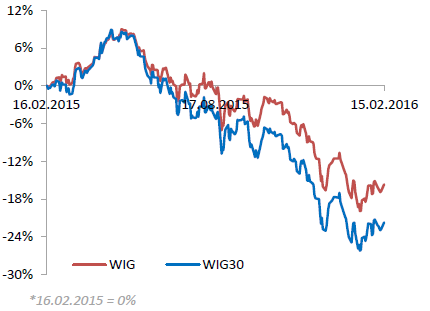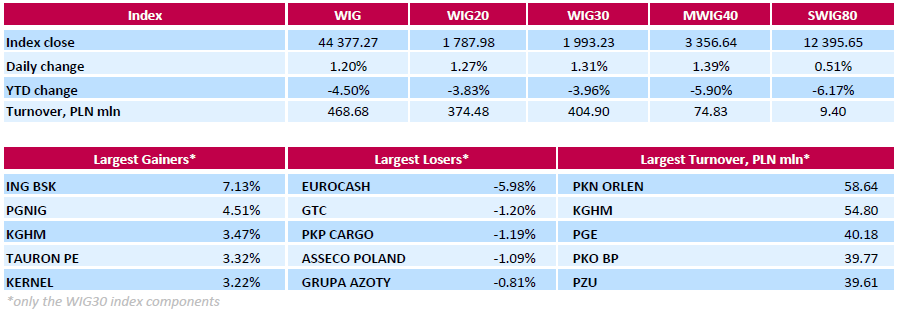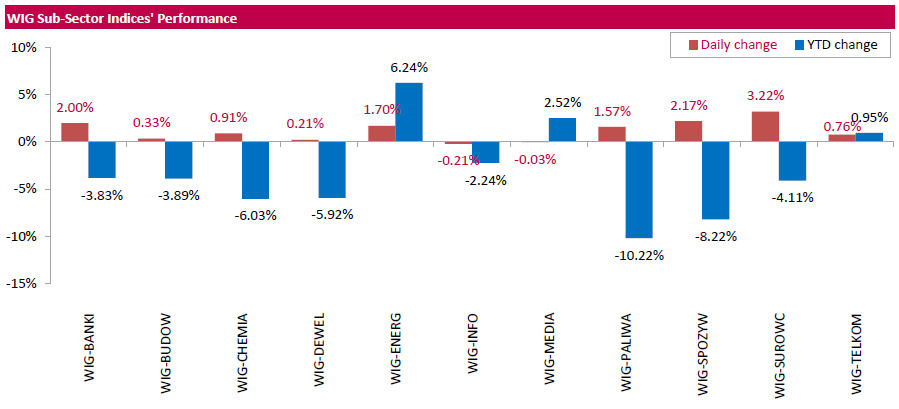Noticias del mercado
-
18:17
WSE: Session Results
Polish equity market surged on Monday. The broad market measure, the WIG index, grew by 1.2%. Sector-wise, IT-sector (-0.21%) tumbled the most, while materials (+3.22%) fared the best.
The large-cap stocks' benchmark, the WIG30 Index, advanced 1.31%. In the index basket, banking sector name ING BSK (WSE: ING) led the advancers, climbing by 7.13%. Other major gainers were oil and gas producer PGNIG (WSE: PGN), copper producer KGHM (WSE: KGH), genco TAURON PE (WSE: TPE) and agricultural producer KERNEL (WSE: KER), adding between 3.22% and 4.51%. On the other side of the ledger, FMCG wholesaler EUROCASH (WSE: EUR) was the weakest name, retreating by 5.98% after hitting a near two-year high in the previous week. It was followed by property developer GTC (WSE: GTC), railway freight transport operator PKP CARGO (WSE: PKP) and IT-company ASSECO POLAND (WSE: ACP), slumping by 1.2%, 1.19% and 1.09% respectively.
-
18:00
European stocks closed: FTSE 5824.28 116.68 2.04%, DAX 9206.84 239.33 2.67%, CAC 40 4115.25 120.19 3.01%
-
18:00
European stocks close: stocks closed higher as shares of banking sector increased
Stock indices closed higher as shares of banking sector increased. Shares of banking sector rose in news that the European Central Bank (ECB) was discussing with the Italian government about buying bad loans from Italian banks. The European Central Bank (ECB) President Mario Draghi said later on Monday that the central bank has no plans to buy bad loans from Italian banks.
Draghi also repeated that the ECB will review its stimulus measures at it monetary policy meeting in March. It downward risks to price stability increase, the central bank will be ready to act, Draghi noted.
Market participants eyed the economic data from the Eurozone. Eurostat released its trade data for the Eurozone on Monday. Eurozone's unadjusted trade surplus increased to €24.3 billion in December from €23.6 billion in November.
Exports rose at an unadjusted annual rate of 3.0% in December, while imports increased 3.0%.
Eurozone's adjusted trade surplus declined to €21.0 billion in December from €22.6 billion in November.
Exports fell at an adjusted 0.3% in December, while imports increased 0.8%.
Indexes on the close:
Name Price Change Change %
FTSE 100 5,824.28 +116.68 +2.04 %
DAX 9,206.84 +239.33 +2.67 %
CAC 40 4,115.25 +120.19 +3.01 %
-
17:03
European Central Bank Executive Board member Benoît Cœuré: the interest rate in the Eurozone will remain low until 2% target will be reached
The European Central Bank (ECB) Executive Board member Benoît Cœuré said in an interview with the German newspaper Rheinische Post published on February 13 that the interest rate in the Eurozone will remain low until 2% target will be reached.
"Rates will have to stay low until we see that the inflation rate in the euro area is moving towards our objective of just below 2%. We at the ECB don't want this phase of low rates to become normality either," he said.
Cœuré pointed out that there are new downside risks to the inflation outlook due to falling oil prices and the slowdown in the global economy.
He noted that the ECB could expand its quantitative easing if needed.
"If necessary, we stand ready to use all of the instruments at our disposal. That includes the key interest rates and the size, composition and duration of our securities purchases," the ECB executive board member said.
Cœuré also said that new financial crisis was unlikely and the Greek crisis was over.
-
16:30
European Central Bank purchases €12.72 billion of government and agency bonds last week
The European Central Bank (ECB) purchased €12.72 billion of government and agency bonds under its quantitative-easing program last week.
The ECB bought €2.23 billion of covered bonds, and €134 million of asset-backed securities.
The European Central Bank (ECB) President Mario Draghi hinted at a press conference in January that the central bank may add further stimulus measures at its meeting in March as downside risks rose.
-
16:13
European Central Bank President Mario Draghi: the central bank has no plans to buy bad loans from Italian banks
The European Central Bank (ECB) President Mario Draghi said on Monday that the central bank has no plans to buy bad loans from Italian banks.
Earlier in the day, Reuters reported that the European Central Bank (ECB) was discussing with the Italian government about buying bad loans from Italian banks as part of its asset-buying programme, according to the Italian Treasury.
-
16:04
European Central Bank President Mario Dragh: the economy in the Eurozone expanded moderately
The European Central Bank (ECB) President Mario Draghi said in a speech on Monday that the economy in the Eurozone expanded moderately, supported by the central bank's quantitative easing and low oil prices. He added that investment remained weak.
Draghi repeated that the ECB will review its stimulus measures at it monetary policy meeting in March. It downward risks to price stability increase, the central bank will be ready to act, Draghi noted.
The ECB president pointed out that fiscal and structural policies should support the recovery in the Eurozone.
"It is becoming clearer and clearer that fiscal policies should support the economic recovery through public investment and lower taxation. In addition, the ongoing cyclical recovery should be supported by effective structural policies," he said.
Draghi noted that the slowdown in emerging economies is a risk to the global economy.
-
15:45
Bundesbank downgrades its inflation forecasts
The German Bundesbank cut its inflation forecasts on Monday. The central bank expects inflation in Germany to be 0.25% in 2016, down from its previous forecast of 1.1%, and 1.75% in 2017, down from its previous forecast of 2.0%. The downward revision was driven by a drop in oil prices.
The Bundesbank also said that the economic growth in Germany would accelerate in the first quarter of 2016 due to a rise in consumption and construction activity.
-
15:13
People's Bank of China Governor Zhou Xiaochuan: there is no need to depreciate the yuan
The People's Bank of China (PBoC) Governor Zhou Xiaochuan said in an interview with Caixin over the weekend that there is no need to depreciate the yuan. He also said that China would not tighten capital controls.
-
14:43
European Central Bank is discussing with the Italian government about buying bad loans from Italian banks
Reuters reported on Monday that the European Central Bank (ECB) was discussing with the Italian government about buying bad loans from Italian banks as part of its asset-buying programme, according to the Italian Treasury.
The ECB declined to comment.
-
12:00
European stock markets mid session: stocks traded higher as shares of banking sector increased
Stock indices traded higher as shares of banking sector increased. Shares of banking sector rose in news that the European Central Bank (ECB) was discussing with the Italian government about buying bad loans from Italian banks.
Market participants eyed the economic data from the Eurozone. Eurostat released its trade data for the Eurozone on Monday. Eurozone's unadjusted trade surplus increased to €24.3 billion in December from €23.6 billion in November.
Exports rose at an unadjusted annual rate of 3.0% in December, while imports increased 3.0%.
Eurozone's adjusted trade surplus declined to €21.0 billion in December from €22.6 billion in November.
Exports fell at an adjusted 0.3% in December, while imports increased 0.8%.
Current figures:
Name Price Change Change %
FTSE 100 5,818.17 +110.57 +1.94 %
DAX 9,216.34 +248.83 +2.77 %
CAC 40 4,126.12 +131.06 +3.28 %
-
11:33
Eurozone's unadjusted trade surplus increases to €24.3 billion in December
Eurostat released its trade data for the Eurozone on Monday. Eurozone's unadjusted trade surplus increased to €24.3 billion in December from €23.6 billion in November.
Exports rose at an unadjusted annual rate of 3.0% in December, while imports increased 3.0%.
Eurozone's adjusted trade surplus declined to €21.0 billion in December from €22.6 billion in November.
Exports fell at an adjusted 0.3% in December, while imports increased 0.8%.
-
10:35
Final industrial production in Japan drops 1.7% in December
Japan's Ministry of Economy, Trade and Industry released its final industrial production data on Monday. Final industrial production in Japan declined 1.7% in December, down from the preliminary estimate of a 1.4% drop, after a 0.9% decrease in November.
Industrial shipments slid 1.8% in December, down from the preliminary estimate of a 1.7% fall, while inventories rose 0.4%, in line with the preliminary estimate.
On a yearly basis, Japan's industrial production was down 1.9% in December, after a 1.7% rise in November.
-
10:15
Japan's tertiary industry activity index drops 0.6% in December
Japan's Ministry of Economy, Trade and Industry released its tertiary industry activity index on Monday. The index dropped 0.6% in December, after a 0.9% fall in November. November's figure was revised down from a 0.8% decline.
The fall was driven by declines in finance and insurance, real Estate, business-related services, electricity, gas, heat supply and water, transport and postal activities, information and communications.
-
09:55
Japan’s preliminary GDP shrinks 0.4% in the fourth quarter
Japan's Cabinet Office released its preliminary gross domestic product (GDP) data for Japan late Sunday. Japan's GDP declined by 0.4% in the fourth quarter, missing expectations for a 0.2% fall, after a 0.3% increase in the third quarter.
The decline was driven by a drop in private consumption. Private consumption dropped 0.8% in the fourth quarter, while capital expenditure climbed 1.4%.
On a yearly basis, Japan's economy shrank 1.4% in the fourth quarter, missing forecasts of 1.2% decline, after a 1.3% rise in the third quarter. The third quarter's figure was revised up from a 1.0% gain.
-
09:39
China's trade surplus climbs to $62.15 billion in January
The Chinese Customs Office released its trade data on Monday. China's trade surplus climbed to $62.15 billion in January from $60.09 billion in December, beating expectations for a decline to a surplus of $58.85 billion.
Exports fell at an annual rate of 11.2% in January, while imports slid at an annual rate of 18.8%, the fifteenth consecutive decline.
-
09:32
Rightmove: U.K. house prices rise 2.9% in February
According to property tracking website Rightmove, U.K. house prices rose 2.9% in February, after a 0.5% increase in January.
Housing demand was higher than ever, Rightmove said in its statement.
"The new year's market has hit the ground running in many locations, continuing last year's momentum and resulting in the price of property coming to the market hitting a new high. Many agents reported high numbers of sales in November and December and properties selling more quickly, so it's encouraging to see signs of replenishment of property, especially in the first-time buyer sector," Rightmove director and housing market analyst, Miles Shipside, said.
On a yearly basis, house prices in the U.K. climbed 7.2% in February, after a 6.5% increase in January.
-
07:25
Global Stocks: U.S. stock indices rose on Friday
U.S. stock indices rose on Friday amid rebounding oil prices, but posted declines over the week.
The Dow Jones Industrial Average surged 313 points, or 2%, to 15,973.84 (-1.4% over the week). The S&P 500 climbed 35.69 points, or 2%, to 1,864.77 (-0.8% over the week). The Nasdaq Composite gained 70.67 points, or 1.7%, to 4,337.51 (-0.6% over the week).
S&P's energy sector gained 2.6% in the previous session. Sentiment improved on Friday, but the turmoil does not seem to be over yet. The S&P 500 fell 5.1% in January and 3.9% in the first half of February.
This morning in Asia Hong Kong Hang Seng gained 2.93%, or 536.45 points, to 18,856.03. China Shanghai Composite Index fell 0.72%, or 19.97 points, to 2,743.52. Meanwhile the Nikkei jumped 7.50%, or 1,121.97 points, to 16,074.58.
Asian stocks traded mixed. Japanese stocks surged after falling to a 16-month low on Friday. The latest gains in U.S. and European equities supported today's growth.
Chinese stocks declined after investors returned from a long holiday. Trading was partly influenced by China's trade balance data. Trade surplus came in at $62.15 billion in January versus $60.90 billion reported previously and $58.85 billion expected by economists. Imports fell by 14.4% y/y after a 7.6% fall in December. Exports declined by 6.6% y/y in January after falling by 1.4% in the previous month.
-
03:28
Nikkei 225 15,665.64 +713.03 +4.77 %, Hang Seng 18,708.5 +388.92 +2.12 %, Shanghai Composite 2,688.31 -75.18 -2.72 %
-
01:02
Stocks. Daily history for Sep Feb 12’2016:
(index / closing price / change items /% change)
Nikkei 225 14,952.61 -760.78 -4.84 %
Hang Seng 18,319.58 -226.22 -1.22 %
Topix 1,196.28 -68.68 -5.43 %
FTSE 100 5,707.6 +170.63 +3.08 %
CAC 40 3,995.06 +98.35 +2.52 %
Xetra DAX 8,967.51 +214.64 +2.45 %
FTSE 100 5,707.6 +170.63 +3.08 %
CAC 40 3,995.06 +98.35 +2.52 %
Xetra DAX 8,967.51 +214.64 +2.45 %
-


